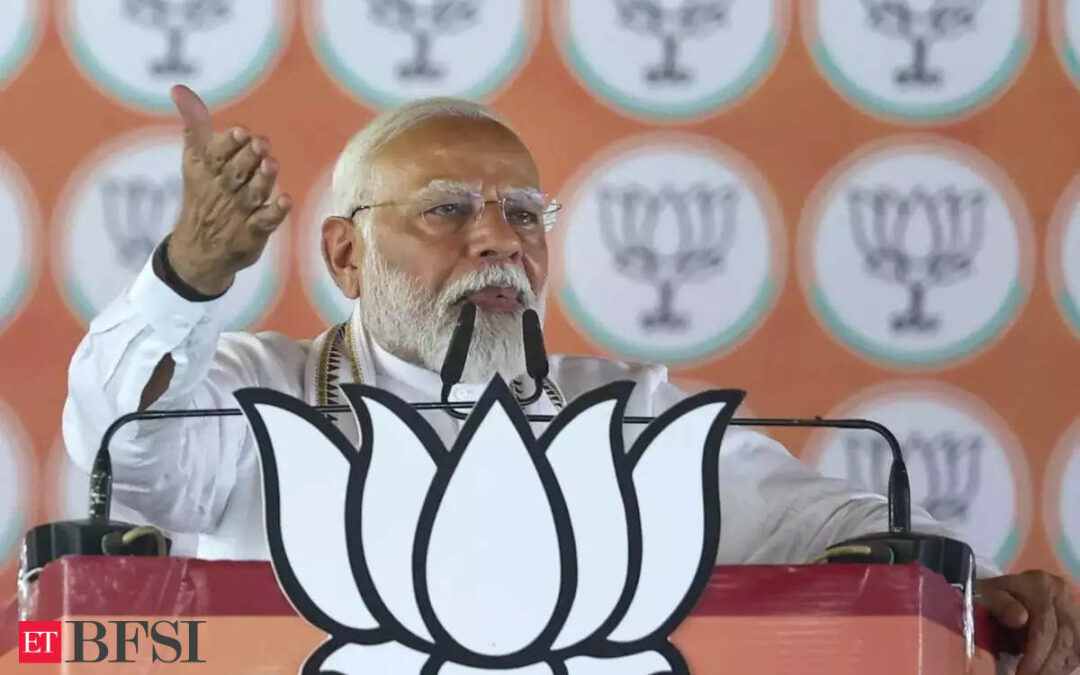Top BFSI economists believe that if the incumbents come into power for the third consecutive time, there will be continuity in policy and reforms, the government will focus and try to reduce distress in the rural economy and job creation will get a boost.
Additionally, commenting on the market’s fall today, the Economists stated that once this knee-jerk reaction is over, the market is expected to regain a strong footing and macro policies are expected to gain traction with an accent on policy continuity and execution.
Policy Continuity, job creation, infra to be focus areas
“If NDA comes back to power, there will be policy continuity. However, the new government is likely to increase focus on uplifting the lower income category and reducing the distress in the rural economy. Given that large part of India’s population lives in the rural areas, improving the plight of the agriculture sector should be the priority of the new government,” said Rajani Sinha, Chief Economist, CareEdge Ratings.
She added that creating enough job opportunities to absorb India’s burgeoning workforce should be the other critical focus area of the new government.
With the NDA alliance partnering for a third term, we see policy continuity in the milieu of India’s robust macroeconomic fundamentals. Besides, a narrow margin victory for the BJP on its own could lead to faster required reforms which will further support India’s growth story.Achala Jethmalani, Economist, RBL Bank
“While India’s large and growing population gives it the opportunity of reaping demographic dividend, if the population is not adequately skilled and enough job opportunities are not created, it can become a burden for the economy,” Sinha said.
With the exit polls indicating BJP’s return to power and the BJP-led NDA ahead in 295 seats while the Congress-led INDIA bloc leading in 229 seats, top BFSI Economists are betting on policy continuity across sectors.
ALSO READ: Election Results: India Inc. cautiously optimistic as BJP may fall short of majority
“The poll results will not alter the basic framework of the policy playbook. Issues like inflation, boosting consumption, and private investment will be the immediate tasks that will be countered with appropriate policy tools with the RBI addressing the first concern on prices. We may not see any slowdown or withdrawal of policies which have been formulated keeping in mind the growth of the economy,” said Madan Sabnavis, Chief Economist, Bank of Baroda.
The Indian economy has been one of the best-performing economies in the last few years and has been driven by inherent strengths and a cogent policy framework. The momentum that has been witnessed will carry on in the coming years through.Madan Sabnavis, Chief Economist, Bank of Baroda
“The goals set in terms of growth like getting to the $ 5 trillion mark to begin with is something everyone in the country wants and hence all policies will be geared towards this objective,” he added.
Madhavi Arora, Lead Economist, Emkay Global Financial Services on the other hand said that the margin of final win will decide the new govt’s political compulsions and policy direction.
There could be a subtle shift towards revenue expenditure over capital expenditure in the July budget. Still, it may not be too significant, nor are we seeing a threat to the direction of Centre’s fiscal deficit consolidation. The capex cycle may also slow if the government pivots.Madhavi Arora, Lead Economist, Emkay Global Financial Services
While this may work well for consumption related sectors, she added that capital goods and PSUs would not be as favorable.
“We do not see broad pillars of India’s macro momentum to change materially,” the lead economist stated.
Impact on Banking & other sectors
Sabnavis further stated that the banking sector is critical for financing the growth process and is guided by the framework set by the RBI which is agnostic to the political scene.
“This is what has been observed in the last 10 years where both the regulators, RBI and SEBI, have worked tirelessly to make the system the best in class and brought in the regulatory processes to maintain the sanctity of the financial system. This will not change for sure,” he said.
He further highlighted that election results on other sectors will be largely driven by endogenous factors affecting demand and supply conditions as well as exogenous factors relating to policy.
These policies are always interactive with stakeholders and would be driven in the same spirit. Hence the overall economic performance for the country should remain on the high growth path.Madan Sabnavis, Chief Economist, Bank of Baroda
Commenting on similar lines, Achala Jethmalani, Economist, RBL Bank said that the banking and financial sector, at large, is expected to grow and contribute only positively to the growth story as we expect policy continuity under the BJP-led alliance for the third time, even with a weaker individual party victory.
Rajani Sinha from CareEdge Ratings asserted that while the new government is likely to continue focus on investing in physical infrastructure, it should also increase its investment in human capital in the form of increased spending on health, education, and skilling.
Sinha further noted that the interesting aspect will be as to how the government balances these spending requirements along with the need to continue on the path of fiscal consolidation.
Stock market’s knee jerk reaction is temporary
Commenting on the steep fall of the Indian markets and future projection, Manoranjan Sharma, Chief Economist, Infomerics Ratings said, “In the wake of a BJP-led coalition government now, the market fell steeply today. But once this knee-jerk reaction is over, we expect the market to regain a strong footing and macro policies to gain traction with an accent on policy continuity and execution.”
He however added that there could be some unease and uncertainty in the interregnum.
Indian markets will continue to move up in the long run as the economy is in good shape. The health of the economy is the work of decades and it will reap the benefits of any action in the long run.
ALSO READ: Election Results: UBS remains ‘underweight’ on India, sees three emerging scenarios
Adding to this, Achala Jethmalani also highlighted that the tighter-than-expected race to the Centre led to a correction in India’s financial markets. Given that markets had ran ahead of itself, the valuations look more promising after today’s correction. Even as the mandate is weaker than expected and with counting underway, the BJP-led NDA alliance is seen forming the government.












